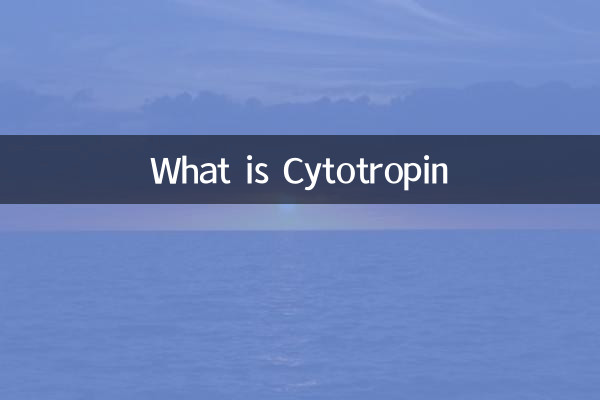What is Cytotropin
Cytokines are a class of small molecule proteins secreted by immune cells or other cells. They play an important role in intercellular signaling, immune regulation, inflammatory response, and cell growth and differentiation. In recent years, with the deepening of biomedical research, the application of cytokines in disease treatment, immunotherapy and regenerative medicine has attracted much attention. The following is a summary of recent hot topics and hot content about cytotropin on the entire Internet.
1. Basic functions of cytokines

The main functions of cytokines include:
| Function type | Specific role | Example |
|---|---|---|
| Immunomodulation | Activate or inhibit immune cells | Interferon (IFN), interleukin (IL) |
| inflammatory response | Promote or suppress inflammation | Tumor necrosis factor (TNF), IL-6 |
| cell growth and differentiation | Regulate cell proliferation and differentiation | Colony stimulating factor (CSF), growth factor (GF) |
2. Recent popular research and applications
1.COVID-19 and Cytokine Storm: Recent studies have shown that some patients with severe COVID-19 will experience a "cytokinin storm" phenomenon, in which the immune system excessively releases cytokines, leading to systemic inflammatory responses. Researchers are exploring ways to alleviate symptoms by inhibiting specific cytokines, such as IL-6.
2.cancer immunotherapy: Cytotropins play a key role in CAR-T cell therapy and PD-1 inhibitors. For example, IL-2 is used to enhance the anti-tumor activity of T cells.
3.regenerative medicine: In stem cell research, cytotropins are used to induce stem cells to differentiate into specific cell types, such as nerve cells or cardiomyocytes.
3. Classification of Cytotropins
Based on function and structure, cytotropins can be divided into the following categories:
| Category | main members | Function |
|---|---|---|
| Interleukin (IL) | IL-1, IL-2, IL-6, etc. | Immunomodulation, inflammatory response |
| Interferon (IFN) | IFN-α, IFN-β, IFN-γ | Antiviral, immune modulation |
| tumor necrosis factor (TNF) | TNF-α, TNF-β | Inflammatory response, apoptosis |
| Growth factors (GF) | EGF, VEGF, FGF | Cell proliferation, tissue repair |
4. The potential of cytokines in disease treatment
1.autoimmune disease: Treats rheumatoid arthritis and psoriasis by inhibiting abnormal cytokines such as IL-17.
2.Infectious diseases: Use the antiviral properties of interferon to treat hepatitis B and hepatitis C.
3.neurological disease: Nerve growth factor (NGF) is being studied as a treatment for Alzheimer's disease.
5. Future Outlook
With the development of gene editing technology and bioengineering, the application fields of cytokines will be further expanded. For example, designing new cytokines through synthetic biology or combining them with nano-delivery systems to improve targeting will become a hot research topic in the future.
In short, cytotropin, as a "messenger" for intercellular communication, has broad application prospects in the medical field. In the next decade, its research and clinical translation are expected to provide new treatment strategies for a variety of diseases.

check the details

check the details